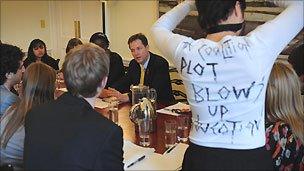Students face tuition fees rising to £9,000
- Published

Universities in England will be able to charge tuition fees of up to £9,000 per year from 2012, as the government transfers much of the cost of courses from the state to students.
Fees will rise to £6,000, with an upper tier of £9,000 if universities ensure access for poorer students.
Universities Minister David Willetts said this was a "progressive" reform.
Labour's Gareth Thomas said the fee hike represented a "tragedy for a whole generation of young people".
But Mr Willetts said the fees package would "put universities' finance on a sustainable footing with extra freedoms and less bureaucracy".
He argued this would bring "greater choice for students with a stronger focus on high quality teaching".
The National Union of Students dubbed the plan, which will mean almost a threefold increase, "an outrage".
The announcement sparked an occupation of an administration building by students at Goldsmiths, University of London.
Students unfurled banners and called for other universities to join the protest.
Much of the proposed fee rise, up from the current £3,290 per year, will replace funding cut from universities in last month's Spending Review.
This will mean that many courses, particularly in arts and humanities, will almost entirely depend on income from students' fees.
'Cash transfusion'
"Essentially, it allows universities to replace a large part of the lost state funding for teaching by way of graduate contributions," said Steve Smith, president of the higher education body, Universities UK.
There were divided responses from different types of university.
The proposals were welcomed by the Russell Group of leading universities as "a life-saving cash transfusion" which would be the "only way for the UK to remain a serious global player in higher education".
But the Million+ group of new universities warned the withdrawal of public funding will mean universities will be forced to charge students the maximum £9,000 - and that the proposals are "very unlikely" to provide a "long-term and sustainable basis" for university funding.
"The fear then must be that the outcome of such high fees will be to damage participation and social mobility," said Million+ chair, Professor Les Ebdon.
Coalition ministers have been trying to achieve a balancing act between a sustainable funding system for universities and a political deal which will head off a Liberal Democrat backbench rebellion.
The party's deputy leader, Simon Hughes, said the proposals were an improvement on Lord Browne's initial plan, but would not be drawn on whether he would vote to support this increase in fees.
Shadow Business Secretary John Denham said Labour would vote against the proposals - saying that it was unfair that the cost of degree courses was being put on to students.
'Ashamed'
NUS president, Aaron Porter, said Liberal Democrat MPs who were going to ditch their election pledge to vote against any rise in fees should be "ashamed of themselves".
Students have complained that voters in university seats were won over by personal promises over fees from the Liberal Democrats, including a video message from party leader Nick Clegg.
Opposition leader Ed Miliband accused the coalition of breaking promises over tuition fees - but Prime Minister David Cameron said that such challenges from Labour showed that "opportunism has overtaken principle".
Mr Willetts, presenting the plans to the House of Commons, confirmed that universities charging higher levels of fees will have to show support for widening access to students from economically poorer backgrounds.
This would mean the type of outreach programmes that many universities already carry out, such as summer schools and targeted scholarships.
This would not mean quotas of students from poor homes, but Mr Willetts promised a "tougher regime" of sanctions if universities made insufficient efforts to attract poorer students.
But Paul Marshall, executive director of the 1994 Group of research-intensive institutions, said universities would be "sceptical of any blanket obligations placed across the sector".
Interest rates on student loans will make repayments more expensive for higher-paid graduates, in what the government describes as a system with a "progressive taper".
Lower payments
Mr Willetts said graduates earning less than £21,000 per year would not pay any real interest on loans, but rates would rise to inflation plus 3% at £41,000 per year and above.
He told MPs that a "quarter of graduates - those on the lowest incomes - will pay less overall than they do at present".
Labour's university spokesman, Gareth Thomas, warned that "students will be forced to choose the cheapest courses, not the one that suits them best".
The University of Leicester has carried out research into how fees will change demand for places - and its initial response to the current plans is that high fees will particularly hit demand for places at less prestigious universities.
Vice-Chancellor Sir Bob Burgess said this would create a market with different levels of fees between institutions, but there was no evidence to suggest that higher fees would lead to a "collapse in participation".
David Barclay, president of Oxford University Student Union, was part of a group of students invited to meet the Liberal Democrat leader Nick Clegg after the announcement.
Mr Barclay described Mr Clegg's attempts to explain the benefits of the proposed system as "evasive".
Clare Solomon, president of the University of London Student Union, said the "atmosphere inside the room was really angry".
A spokesman for Mr Clegg said there had been a "lively exchange of views".
The changes in tuition fees will apply to universities in England. Scottish students studying in Scotland do not have to pay any fees. In Northern Ireland and Wales, fees are currently charged up to a maximum of £3,290.